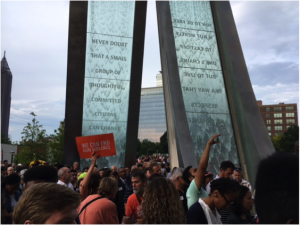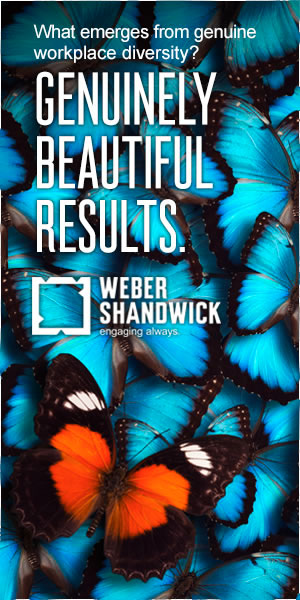It’s been one year since the LGBT Institute was launched in Atlanta, and already the initiative aimed at spotlighting, developing and advancing policies that support equal and fair treatment of the world’s LGBT population is off to a strong start.
The Institute, which is a part of the Atlanta-based Center for Civil and Human Rights, has engaged more than 100 community leaders as stakeholders, announced its first symposium, launched plans in partnerships with Georgia State University for a survey about the LGBT experience in the south, and served as the official host for a local vigil in support of those affected by the June 2016 nightclub shooting in Orlando.
The LGBT Institute’s one-year anniversary, which was in September, arrived just ahead of October’s LGBT History Month. The organization’s Atlanta home provides a space for convening the leaders and minds of the LGBT community, making it an integral place and platform for creating and fostering meaningful dialogue.
Weber Shandwick’s Atlanta office helped establish the LGBT Institute, acting as a partner, providing public relations and communications guidance, contributing outreach and event planning, and providing counsel on programming decisions. One such program, for example, was the “We Are Orlando” vigil, which played a significant role in helping the local community come together and mourn, following the nightclub shootings.
“It’s been really incredible to watch this start from nothing to become something that’s on this track to being an authoritative voice in the LGBT community,” said Heather Hughes, lead media specialist in Weber Shandwick’s Atlanta office.
 The Institute’s accomplishments over the past year include educating and engaging the Atlanta community about its LGBT history through events and tours. Hughes added that one of the most exciting initiatives is a survey partnership with Georgia State University, which will target respondents in all 14 southern states. The results will be available early next year, and according to Hughes, “it will help us gain a better understanding of the needs of the LGBT community and shine a spotlight on any issues that aren’t being talked about, especially for the LGBT people that are sitting at an intersection—people of color, or people at the intersection of identity.”
The Institute’s accomplishments over the past year include educating and engaging the Atlanta community about its LGBT history through events and tours. Hughes added that one of the most exciting initiatives is a survey partnership with Georgia State University, which will target respondents in all 14 southern states. The results will be available early next year, and according to Hughes, “it will help us gain a better understanding of the needs of the LGBT community and shine a spotlight on any issues that aren’t being talked about, especially for the LGBT people that are sitting at an intersection—people of color, or people at the intersection of identity.”
The survey, Hughes said, is especially critical for the Institute and the community it serves because of the role data plays in our society “for making any kind of a case, but also for making informed decisions and having an informed dialogue.” She added that one of the most surprising and encouraging responses to the LGBT Institute and its work so far has come from the media—which has been especially interested and receptive, from local outlets to major ones around the globe.
The past year’s efforts to connect with various organizations and community leaders has set the groundwork for future success. The upcoming November 18 symposium, which is sponsored by Delta Airlines, will focus on “how businesses, particularly in the southeast, are navigating this terrain of inclusion—especially as people are really beginning to notice the social change that’s taking place in this country,” Hughes said.
Looking ahead, Hughes has her sights set on connecting with and supporting the community’s full scope of LGBT groups — making sure “we’re dovetailing with their mission, as opposed to superseding it.” The LGBT Institute, she said, is now poised for a strong future. “A lot of this first year has been finding their feet and finding our voice. It really started to make a big impact, and I feel like it’s one to watch for years to come.”

